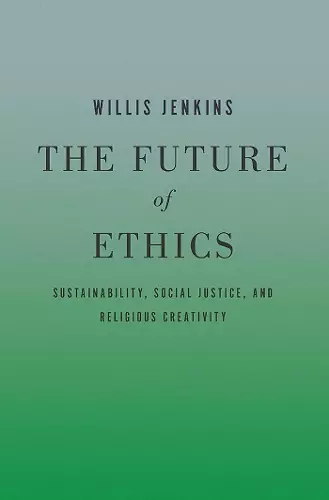The Future of Ethics
Sustainability, Social Justice, and Religious Creativity
Format:Paperback
Publisher:Georgetown University Press
Published:24th Oct '13
Currently unavailable, and unfortunately no date known when it will be back

Willis Jenkins has written a brilliant and challenging book that deserves a wide readership. His penetrating question, 'What shall we sustain and why?' rings true as a humane call for ever-more engaged reflection from ethicists and environmentalists interested in the future of our shared planetary life. -- Mary Evelyn Tucker, Forum on Religion and Ecology, Yale University When first I saw the title, The Future of Ethics, I thought it overwrought, if not pretentious. Then I read the book. This is a major, far-reaching, even indispensable, work, for the present as well as the future. Yes, I have my arguments with Jenkins. But if he is as instructed by my exchange as I am by his, both of us will be the wiser about what counts most-achieving a viable way of life for a planet in jeopardy at human hands. -- Larry Rasmussen, Reinhold Niebuhr Professor Emeritus of Social Ethics, Union Theological Seminary, New York City Rather than a book of despair, Jenkins argues for the possibility of religious ethics charting new strategies of moral agency by working within the traditions that form constantly shifting communities to meet the challenges of climate change and sustainability. Carefully argued, creative, and well-written, Jenkins challenges assumptions. This is a must read book. -- Emilie Townes, Dean and Carpenter Distinguished Professor of Ethics and Society, Vanderbilt Divinity School
Integrating environmental sciences and theological ethics into problem-based engagements with philosophy, economics, and other disciplines, this book illustrates the wide understanding and moral creativity needed to live well in the new conditions of human power.The Future of Ethics interprets the big questions of sustainability and social justice through the practical problems arising from humanity's increasing power over basic systems of life. What does climate change mean for our obligations to future generations? How can the sciences work with pluralist cultures in ways that will help societies learn from ecological change? Traditional religious ethics examines texts and traditions and highlights principles and virtuous behaviors that can apply to particular issues. Willis Jenkins develops lines of practical inquiry through "prophetic pragmatism," an approach to ethics that begins with concrete problems and adapts to changing circumstances. This brand of pragmatism takes its cues from liberationist theology, with its emphasis on how individuals and communities actually cope with overwhelming problems. Can religious communities make a difference when dealing with these issues? By integrating environmental sciences and theological ethics into problem-based engagements with philosophy, economics, and other disciplines, Jenkins illustrates the wide understanding and moral creativity needed to live well in the new conditions of human power. He shows the significance of religious thought to the development of interdisciplinary responses to sustainability issues and how this calls for a new style of religious ethics.
This book's strength is its scope, which encompasses theology, international human rights law, and innovative approaches to ethical thinking about problems that cross cultural and religious boundaries. Students of Christian ethics - especially those concerned with the links between religion and environmental advocacy/action - will find this extraordinary book very worthwhile. Choice
- Winner of Award for Excellence 6 (United States)
- Winner of Outstanding Academic Book of the Year.
- Winner of Outstanding Academic Book of the Year 6 (United States)
ISBN: 9781626160170
Dimensions: unknown
Weight: 499g
304 pages